Tilda Swinton Michael Clayton Interview
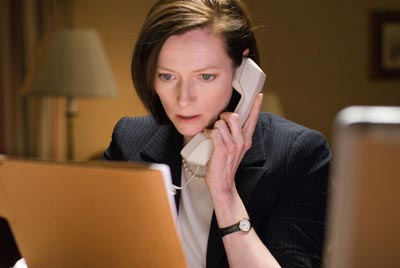
TILDA SWINTON TAKES ON MICHAEL CLAYTON
EXCLUSIVE Interview by Paul Fischer
Tall, elegant and ferociously intellectual Scottish actress Tilda Swinton returns to the screen in fine form as an almost carnivorous lawyer up against George Clooney's Michael Clayton, in the new thriller. Swinton doesn't have the largest part but it's compelling and fascibnating to watch the actress at work. In a Toronto hotel room on the eve of the film's bow at this year's Toronto Film Festival, the always fascinating actress talks Hollywood and acting with Paul Fischer.
Paul Fischer: When you get offered a studio movie like this and George Clooney is cast as the lead, what trepidation do you have about taking something like this on as there is a tendency to be overshadowed by everything else?
Tilda Swinton: Frankly, none. I mean this is obviously a film which plays within a genre, but it's written by someone who's so sophisticated and playing with that genre in such a way that you're not only dealing with a hero and a villain, but also a few collateral damage victims along the way. You're dealing with someone who's really looking at character and human behavior and so he can write a part like the part that I'm asked to play in this and really make it a meal in itself for the person who gets to do it, which I'm very grateful to say was me. It was a really, really fun adventure. I don't think I've ever thought of what those trepidations might be and for me I'm such a tourist to go into that world with these people, which was really exotic.
Paul Fischer: Why do you see yourself as a tourist?
Tilda Swinton: Well I mean I'm kind of on a kind of cinema zelig kick these days, and have been for a while. While my children are so small that I can't be in every single frame of a four month shoot then it's a great way to go because I can come and go. And when those people who are asking you to go and check in for a while are people like Tony Gilroy and George Clooney, it's really a pleasure because they're such conscientious filmmakers, they know the genre they're dealing with, and they know the market they're dealing with. They're sophisticated enough to play with it but they're also classical enough to want to celebrate it. We all knew what bells were ringing with the film.
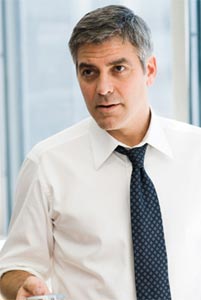 Paul Fischer: Do you need to be empathetic towards a character who is primarily unsympathetic?
Paul Fischer: Do you need to be empathetic towards a character who is primarily unsympathetic?
Tilda Swinton: You know it's hard to imagine a human being whom one can't find some sympathy for. But I'm not a performer who needs to love my characters or whatever they say. That's not an issue for me. I mean all a character is, is a set of behaviours and a set of actions so you can pick up the story. I think that she has looked at a lot of photographs of Condoleezza Rice and probably took a photograph of her into the hairdresser in the Hilton Hotel in Manhattan at the very end of the film when she's putting together her power look and said 'I want that one'. You know, she's an officer, a solider and she wears a uniform. And women in those jobs unashamedly conform to a type. They have to, because you can virtually get sacked for wearing the wrong shoes in that kind of world. So I walked around uptown New York and looked into various offices and saw what the vibe was.
Paul Fischer: This is a film about power and ambition ---
Tilda Swinton: I suppose it is, but I feel that more accurately it's about a kind of addiction. That's what I feel having seen it again last night, because thinking about it, you know, addiction is a very important subtext to the film. Not only do we have Clayton and his gambling addiction and his brother with his drug and alcohol addiction , but you also have the addiction of someone like Karen Crowder or Tom Wilkinson's character, Arthur Edens, or Sydney Pollack's character, Marty Bach, who are to be addicted to the idea that it's a good thing to deal in billions of dollars. These are campaigns that human beings can go into without actually wrecking their souls. That's an addiction, so I think the film is not so much about the power as anaesthesia, about how these people, and we all wonder this, particularly those of us who don't work in those worlds, you sort of think 'How is it possible for those people to do the things they do, to bandy around billions of dollars, to strike deals which write-off people's lives?'
Paul Fischer: This is a film about addiction and there was a time when you were probably addicted to the idea of acting and that was your passion. Have your priorities changed now as a mother? Are you less passionate about the profession that you might have once been?
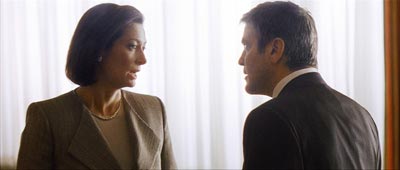 Tilda Swinton: You see I was never addicted. I've never been addicted to acting. Acting is something that I have relatively little interest in. If I'm addicted to anything I would say, I've always been a paid up film fan and the idea of being able to make film is still truly thrilling to me. That hasn't changed at all. If anything, and my modus operandi has not only not changed but it's crystallized, because I was, as you know, spoiled very early. I started working with one filmmaker, Derek Jarman, for nine years on seven films and I learned very early to get a really low pain threshold and work with my friends, and I feel happy while working. And I have never, fortunately, had to move outside of that, even with the death of Derek Jarman, on it goes for me. I'm so blessed. I keep running into people who become new friends and that family atmosphere. I wouldn't call it an addiction, but those are my terms of engagement and fortunately I am still able to keep them going even with people I've never met before.
Tilda Swinton: You see I was never addicted. I've never been addicted to acting. Acting is something that I have relatively little interest in. If I'm addicted to anything I would say, I've always been a paid up film fan and the idea of being able to make film is still truly thrilling to me. That hasn't changed at all. If anything, and my modus operandi has not only not changed but it's crystallized, because I was, as you know, spoiled very early. I started working with one filmmaker, Derek Jarman, for nine years on seven films and I learned very early to get a really low pain threshold and work with my friends, and I feel happy while working. And I have never, fortunately, had to move outside of that, even with the death of Derek Jarman, on it goes for me. I'm so blessed. I keep running into people who become new friends and that family atmosphere. I wouldn't call it an addiction, but those are my terms of engagement and fortunately I am still able to keep them going even with people I've never met before.
Paul Fischer: Has your criteria for choice changed?
Tilda Swinton: Well there's been a period over the last two or three years, you know, or maybe a little longer while my children have been little, because we live in the north of Scotland and not that many films are made there. And because it's a really beautiful place, it's a good place for them to be, I can't be away from it for very long So that cuts down the opportunities. I haven't been able to take a long distance project for a long time, for a while, although I'm at that, that will be changing. I've just made, as I say, with Eric Zonker in which I'm in every frame again and that's to a certain extent what I'm really good for. And I haven't been able to exercise it for a while so it's nice to get back to that.
Paul Fischer: What kind of character is this?
Tilda Swinton: I play an alcoholic. It's truly about addiction, that one.
Paul Fischer: So it's a comedy?
Tilda Swinton: It's an icecapade. It's all singing, all dancing. It actually is, there are quite a few laughs in it. But she's an alcoholic who abducts a child for money and goes on the run with him to Mexico. going to be rocking.
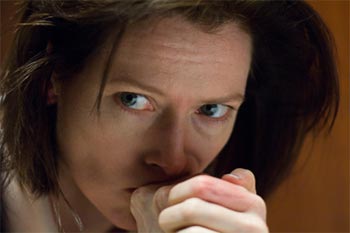 Paul Fischer: But they're the kinds of things you do very well, I think, those kinds of very dark, almost uninhibited characters, yet you're not that in person. I wonder where that all comes from.
Paul Fischer: But they're the kinds of things you do very well, I think, those kinds of very dark, almost uninhibited characters, yet you're not that in person. I wonder where that all comes from.
Tilda Swinton: Well it's all just dressing up and playing isn't it? I mean it's not rocket science. I'm just doing what my nine year old children do every day.
Paul Fischer: Is it true that you gained weight for Clayton? I mean it's interesting because normally when actors gain weight or lose weight there's usually some physiological reason.
Tilda Swinton: I think it was really important that she should feel really uncomfortable in her skin, because she's a poor actress badly cast. That's how I see her. She should not be in this job and I had this image early on of her in the script that she should be running on a treadmill and I thought, I just visualised someone lean running on a treadmill. That means one thing. It means that success is within their grasp, someone with a pot belly running on a treadmill, it moves me. It means this person is constantly striving for something that they can't quite get their hands on. And this first image of her being in front of the mirror with this fat roll, that was an image that I had very early.
Paul Fischer: And did you eat yourself into a frenzy to gain the weight?
Tilda Swinton: I just ate a lot of pies, which was great.
Paul Fischer: And how did you lose it then?
Tilda Swinton: I kind of just ate normally afterwards. I wanted her to have this sort of itchy feeling about her body so her clothes were always either too tight or her underwear was too tight but her clothes actually don't fit, stressing like Barbara Bush, you know, something a bit dissonant about her.
Paul Fischer: Now you've produced of course. What about directorial ambitions?
Tilda Swinton: I'll get back to you on that Paul, in the next few years. We'll see about that. The jury is out at the moment, but I'm learning from some great directors.
Paul Fischer: And writing?
Tilda Swinton: I do write and I am writing, yes.
Paul Fischer: Doing a script?
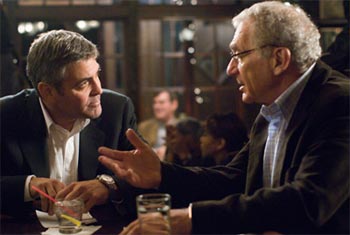 Tilda Swinton: I am actually writing a script, yeah.
Tilda Swinton: I am actually writing a script, yeah.
Paul Fischer: Is it going to be another dark, nihilistic, depressing, wrist-slashing ....
Tilda Swinton: Now you said that, no. I'm changing my whole idea. No actually. And I wish I hadn't even said it now. I get embarrassed - it's so too early to talk about it. But one day we will talk about it.
Paul Fischer: You need to do a really outlandish comedy.
Tilda Swinton: Well funnily enough that's definitely on the dance card, yeah. It's sort of slowly, slowly seeping out.
Paul Fischer: You don't see that side of you very often. Except in interviews.
Tilda Swinton: No it's a sort of dark secret which I keep from the world. But anybody in the United Kingdom who looks like me would be good for a laugh.
Paul Fischer: Did Clooney make you laugh on the set?
Tilda Swinton: Yeah. He's a good sparring partner. We're making another film together now with the Coen Brothers.
Paul Fischer: You and George?
Tilda Swinton: George, John Malkovich, Francis McDormand, Brad Pitt.
Paul Fischer: What a terrible cast of unknowns.
Tilda Swinton: You know, we couldn't get anybody else.
Paul Fischer: Do you have any love scenes with any of these people?
Tilda Swinton: I'm married to John Malkovich and I am the lover, there's no other word, of Mr George Clooney.
Paul Fischer: It's a tough life.
Tilda Swinton: I'm trying, but my agents say that they can't do anything, you know, we're just taking what we can.
Paul Fischer: How would you define the film?
Tilda Swinton: I haven't cleared this with them so I hope they don't kill me for saying this because of course it's way too early to talk about it, but I would call it a caper movie. I think this is a, you know, pretty red label Cohen tone.
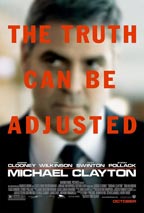
Tall, elegant and ferociously intellectual Scottish actress Tilda Swinton returns to the screen in fine form as an almost carnivorous lawyer up against George Clooney's Michael Clayton, in the new thriller. Swinton doesn't have the largest part but it's compelling and fascibnating to watch the actress at work. In a Toronto hotel room on the eve of the film's bow at this year's Toronto Film Festival, the always fascinating actress talks Hollywood and acting with Paul Fischer.
Paul Fischer: When you get offered a studio movie like this and George Clooney is cast as the lead, what trepidation do you have about taking something like this on as there is a tendency to be overshadowed by everything else?
Tilda Swinton: Frankly, none. I mean this is obviously a film which plays within a genre, but it's written by someone who's so sophisticated and playing with that genre in such a way that you're not only dealing with a hero and a villain, but also a few collateral damage victims along the way. You're dealing with someone who's really looking at character and human behavior and so he can write a part like the part that I'm asked to play in this and really make it a meal in itself for the person who gets to do it, which I'm very grateful to say was me. It was a really, really fun adventure. I don't think I've ever thought of what those trepidations might be and for me I'm such a tourist to go into that world with these people, which was really exotic.
Paul Fischer: Why do you see yourself as a tourist?
Tilda Swinton: Well I mean I'm kind of on a kind of cinema zelig kick these days, and have been for a while. While my children are so small that I can't be in every single frame of a four month shoot then it's a great way to go because I can come and go. And when those people who are asking you to go and check in for a while are people like Tony Gilroy and George Clooney, it's really a pleasure because they're such conscientious filmmakers, they know the genre they're dealing with, and they know the market they're dealing with. They're sophisticated enough to play with it but they're also classical enough to want to celebrate it. We all knew what bells were ringing with the film.
 Paul Fischer: Do you need to be empathetic towards a character who is primarily unsympathetic?
Paul Fischer: Do you need to be empathetic towards a character who is primarily unsympathetic?Tilda Swinton: You know it's hard to imagine a human being whom one can't find some sympathy for. But I'm not a performer who needs to love my characters or whatever they say. That's not an issue for me. I mean all a character is, is a set of behaviours and a set of actions so you can pick up the story. I think that she has looked at a lot of photographs of Condoleezza Rice and probably took a photograph of her into the hairdresser in the Hilton Hotel in Manhattan at the very end of the film when she's putting together her power look and said 'I want that one'. You know, she's an officer, a solider and she wears a uniform. And women in those jobs unashamedly conform to a type. They have to, because you can virtually get sacked for wearing the wrong shoes in that kind of world. So I walked around uptown New York and looked into various offices and saw what the vibe was.
Paul Fischer: This is a film about power and ambition ---
Tilda Swinton: I suppose it is, but I feel that more accurately it's about a kind of addiction. That's what I feel having seen it again last night, because thinking about it, you know, addiction is a very important subtext to the film. Not only do we have Clayton and his gambling addiction and his brother with his drug and alcohol addiction , but you also have the addiction of someone like Karen Crowder or Tom Wilkinson's character, Arthur Edens, or Sydney Pollack's character, Marty Bach, who are to be addicted to the idea that it's a good thing to deal in billions of dollars. These are campaigns that human beings can go into without actually wrecking their souls. That's an addiction, so I think the film is not so much about the power as anaesthesia, about how these people, and we all wonder this, particularly those of us who don't work in those worlds, you sort of think 'How is it possible for those people to do the things they do, to bandy around billions of dollars, to strike deals which write-off people's lives?'
Paul Fischer: This is a film about addiction and there was a time when you were probably addicted to the idea of acting and that was your passion. Have your priorities changed now as a mother? Are you less passionate about the profession that you might have once been?
 Tilda Swinton: You see I was never addicted. I've never been addicted to acting. Acting is something that I have relatively little interest in. If I'm addicted to anything I would say, I've always been a paid up film fan and the idea of being able to make film is still truly thrilling to me. That hasn't changed at all. If anything, and my modus operandi has not only not changed but it's crystallized, because I was, as you know, spoiled very early. I started working with one filmmaker, Derek Jarman, for nine years on seven films and I learned very early to get a really low pain threshold and work with my friends, and I feel happy while working. And I have never, fortunately, had to move outside of that, even with the death of Derek Jarman, on it goes for me. I'm so blessed. I keep running into people who become new friends and that family atmosphere. I wouldn't call it an addiction, but those are my terms of engagement and fortunately I am still able to keep them going even with people I've never met before.
Tilda Swinton: You see I was never addicted. I've never been addicted to acting. Acting is something that I have relatively little interest in. If I'm addicted to anything I would say, I've always been a paid up film fan and the idea of being able to make film is still truly thrilling to me. That hasn't changed at all. If anything, and my modus operandi has not only not changed but it's crystallized, because I was, as you know, spoiled very early. I started working with one filmmaker, Derek Jarman, for nine years on seven films and I learned very early to get a really low pain threshold and work with my friends, and I feel happy while working. And I have never, fortunately, had to move outside of that, even with the death of Derek Jarman, on it goes for me. I'm so blessed. I keep running into people who become new friends and that family atmosphere. I wouldn't call it an addiction, but those are my terms of engagement and fortunately I am still able to keep them going even with people I've never met before. Paul Fischer: Has your criteria for choice changed?
Tilda Swinton: Well there's been a period over the last two or three years, you know, or maybe a little longer while my children have been little, because we live in the north of Scotland and not that many films are made there. And because it's a really beautiful place, it's a good place for them to be, I can't be away from it for very long So that cuts down the opportunities. I haven't been able to take a long distance project for a long time, for a while, although I'm at that, that will be changing. I've just made, as I say, with Eric Zonker in which I'm in every frame again and that's to a certain extent what I'm really good for. And I haven't been able to exercise it for a while so it's nice to get back to that.
Paul Fischer: What kind of character is this?
Tilda Swinton: I play an alcoholic. It's truly about addiction, that one.
Paul Fischer: So it's a comedy?
Tilda Swinton: It's an icecapade. It's all singing, all dancing. It actually is, there are quite a few laughs in it. But she's an alcoholic who abducts a child for money and goes on the run with him to Mexico. going to be rocking.
 Paul Fischer: But they're the kinds of things you do very well, I think, those kinds of very dark, almost uninhibited characters, yet you're not that in person. I wonder where that all comes from.
Paul Fischer: But they're the kinds of things you do very well, I think, those kinds of very dark, almost uninhibited characters, yet you're not that in person. I wonder where that all comes from. Tilda Swinton: Well it's all just dressing up and playing isn't it? I mean it's not rocket science. I'm just doing what my nine year old children do every day.
Paul Fischer: Is it true that you gained weight for Clayton? I mean it's interesting because normally when actors gain weight or lose weight there's usually some physiological reason.
Tilda Swinton: I think it was really important that she should feel really uncomfortable in her skin, because she's a poor actress badly cast. That's how I see her. She should not be in this job and I had this image early on of her in the script that she should be running on a treadmill and I thought, I just visualised someone lean running on a treadmill. That means one thing. It means that success is within their grasp, someone with a pot belly running on a treadmill, it moves me. It means this person is constantly striving for something that they can't quite get their hands on. And this first image of her being in front of the mirror with this fat roll, that was an image that I had very early.
Paul Fischer: And did you eat yourself into a frenzy to gain the weight?
Tilda Swinton: I just ate a lot of pies, which was great.
Paul Fischer: And how did you lose it then?
Tilda Swinton: I kind of just ate normally afterwards. I wanted her to have this sort of itchy feeling about her body so her clothes were always either too tight or her underwear was too tight but her clothes actually don't fit, stressing like Barbara Bush, you know, something a bit dissonant about her.
Paul Fischer: Now you've produced of course. What about directorial ambitions?
Tilda Swinton: I'll get back to you on that Paul, in the next few years. We'll see about that. The jury is out at the moment, but I'm learning from some great directors.
Paul Fischer: And writing?
Tilda Swinton: I do write and I am writing, yes.
Paul Fischer: Doing a script?
 Tilda Swinton: I am actually writing a script, yeah.
Tilda Swinton: I am actually writing a script, yeah. Paul Fischer: Is it going to be another dark, nihilistic, depressing, wrist-slashing ....
Tilda Swinton: Now you said that, no. I'm changing my whole idea. No actually. And I wish I hadn't even said it now. I get embarrassed - it's so too early to talk about it. But one day we will talk about it.
Paul Fischer: You need to do a really outlandish comedy.
Tilda Swinton: Well funnily enough that's definitely on the dance card, yeah. It's sort of slowly, slowly seeping out.
Paul Fischer: You don't see that side of you very often. Except in interviews.
Tilda Swinton: No it's a sort of dark secret which I keep from the world. But anybody in the United Kingdom who looks like me would be good for a laugh.
Paul Fischer: Did Clooney make you laugh on the set?
Tilda Swinton: Yeah. He's a good sparring partner. We're making another film together now with the Coen Brothers.
Paul Fischer: You and George?
Tilda Swinton: George, John Malkovich, Francis McDormand, Brad Pitt.
Paul Fischer: What a terrible cast of unknowns.
Tilda Swinton: You know, we couldn't get anybody else.
Paul Fischer: Do you have any love scenes with any of these people?
Tilda Swinton: I'm married to John Malkovich and I am the lover, there's no other word, of Mr George Clooney.
Paul Fischer: It's a tough life.
Tilda Swinton: I'm trying, but my agents say that they can't do anything, you know, we're just taking what we can.
Paul Fischer: How would you define the film?
Tilda Swinton: I haven't cleared this with them so I hope they don't kill me for saying this because of course it's way too early to talk about it, but I would call it a caper movie. I think this is a, you know, pretty red label Cohen tone.

Michael Clayton
Starring: George Clooney, Tom Wilkinson, Tilda Swinton, Sydney Pollack
Director: Tony Gilroy
Michael Clayton (George Clooney) is an in-house "fixer" at one of the largest corporate law firms in New York. A former criminal prosecutor, Clayton takes care of Kenner, Bach & Ledeen's dirtiest work at the behest of the firm's co-founder Marty Bach (Sydney Pollack). Though burned out and hardly content with his job as a fixer, his divorce, a failed business venture and mounting debt have left Clayton inextricably tied to the firm. At U/North, meanwhile, the career of litigator Karen Crowder (Tilda Swinton) rests on the multi-million dollar settlement of a class action suit that Clayton's firm is leading to a seemingly successful conclusion. But when Kenner Bach's brilliant and guilt-ridden attorney Arthur Edens (Tom Wilkinson) sabotages the U/North case, Clayton faces the biggest challenge of his career and his life.
Director: Tony Gilroy
Michael Clayton (George Clooney) is an in-house "fixer" at one of the largest corporate law firms in New York. A former criminal prosecutor, Clayton takes care of Kenner, Bach & Ledeen's dirtiest work at the behest of the firm's co-founder Marty Bach (Sydney Pollack). Though burned out and hardly content with his job as a fixer, his divorce, a failed business venture and mounting debt have left Clayton inextricably tied to the firm. At U/North, meanwhile, the career of litigator Karen Crowder (Tilda Swinton) rests on the multi-million dollar settlement of a class action suit that Clayton's firm is leading to a seemingly successful conclusion. But when Kenner Bach's brilliant and guilt-ridden attorney Arthur Edens (Tom Wilkinson) sabotages the U/North case, Clayton faces the biggest challenge of his career and his life.
MORE





